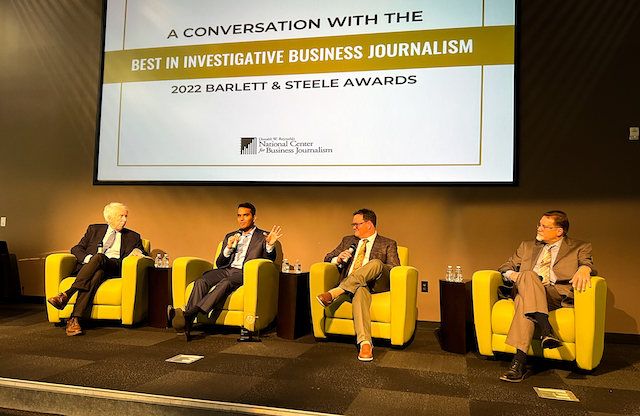Last Wednesday, we welcomed the winners of the 16th annual Barlett and Steele Awards for the best in investigative business journalism to the Walter Cronkite School for Journalism and Mass Communication. The Gold winners were invited to the stage to have a conversation with Jim Steele and answer questions from journalism students. Here is some of the advice they gave aspiring investigative and business journalists.
How to start a big story
The idea of starting a big investigation is both exciting and overwhelming for even the most seasoned journalist, but every story has to begin somewhere.
Neil Bedi, the winner of the first-ever Outstanding Young Journalist award for his investigation into defective heart pumps and what the FDA knew about it, noted that some questions he asks himself at the start of a new story are: Who is this story impacting? What evidence of impact do I have? Is the data there?
Bedi said he starts poking holes into his own story from the beginning and keeps that mindset throughout the entire process. He noted that you need to know what holes exist, that others may find, so that you can fill them. And if you can’t fill them, then you may not have a story after all.
“The start is always about building your body of evidence, because you need to know you have a story before you go much further.” said Bedi. He also emphasized the importance of having a good relationship with your editor, and regularly checking in with them on where you are going and where things may not hold up. “You’re never going off into the distance, possibly failing, you want to give yourself those safety rails.”
How to investigate private companies
Investigating public companies is often done because of how much easier it is to get company information, but that shouldn’t sway you from covering the private sector.
Curtis Gilbert, a member of the Gold-winning team that produced the investigative podcast ‘Sent Away,’ said that even though the company itself may be private, almost every business is going to have some touchpoints with the government. For example, in their investigation into the troubled-teen industry the private facilities still needed to be licensed and had to pass regular inspections by the government, which are public records. There are contracts between these companies and states that send the teens through court orders. Additionally, police have been called to these facilities, so you can get access to 911 call logs, police reports, or even see criminal charges that have been filed.
“What seems at first like a black box,” Gilbert said, “there is actually a lot of places you can start looking into it. And then you kinda start putting those puzzle pieces together and then you start finding people.” Public records can lead you to sources you may not have thought of on your own and people can also point you where to find more records or information.
How to ‘prove’ yourself to your editor
Every would-be investigative journalist has to start somewhere. How do you prove to your editor that you’re ready to take on a big investigative business story?
“It’s all about baby steps and showing that I have both an interest and an ability to execute something that didn’t come from a press release,” said Jeffrey Meitrodt, the Gold winner of the local/regional category for his investigation into how insurance companies were taking advantage of accident victims.
Meitrodt said that he went from being a business beat reporter of many years to investigating businesses full-time because he started with smaller stories that took a few days or a week to complete. These stories weren’t in plain sight and took a little more imagination to find or uncover and they weren’t just given to him by a single source. He continued that he would find bigger and better stories until editors started picking him for stories because of his shown investigative ability.
Gilbert also chimed in that being interested and experienced in data reporting can only help you be a better investigative reporter and put you ahead of your peers. He said that students should be willing to take computer science courses and get more comfortable with data analysis because it can really jump-start your career.
“You’ll be very marketable at a young age if you’re willing to do that kind of work and that kind of sets you apart,” noted Gilbert. “I wish I had done that earlier.”
–
If you’re interested in hearing more of what the award-winning journalists had to say watch the full event here. You can also view all the winners from the 2022 Barlett and Steele Awards here.






